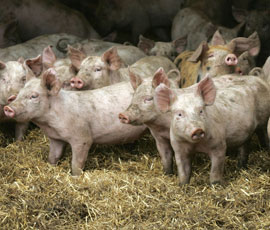Swine flu incidence higher than thought

Nearly three-quarters of British pig herds are infected with swine flu, according to new findings.
Routine diagnostic blood testing in the UK and Ireland indicated that the incidence of the disease could be higher than expected, with more than 70% of British herds having one or more pigs test positive. This figure increased to more than 90% in Ireland.
Brian Rice, veterinary adviser with Merial Animal Health, said: “Historically, and with no vaccine available, the industry has tended to be reactive to swine influenza, managing outbreaks as they arose, but more and more producers are now realising the benefits of vaccinating against the disease.
“There is a strong economic case for considering preventative treatment. Swine influenza causes fever, apathy, anorexia and respiratory signs such as dyspnoea and sneezing, which affect both welfare and productivity. In sows it can affect return to oestrus, cause abortion, increase the number of stillborn piglets and decrease lactation.”
Previous research carried out in 2008-9 by the Royal Veterinary College and the COSI Consortium across a broader sample of about 17% of the English herd showed nearly six in 10 farms (59%) had pigs that were positive for one of the strains of swine influenza.
“Many people may be surprised by just how widespread the disease is but the real question is how they plan to mitigate the potential risks posed by swine influenza to the productivity of their herds,” said Mr Rice.
Producers should talk to their vet and investigate the herd’s swine influenza status to implement appropriate preventative measures.
Read how Egypt culled pigs for swine flu
